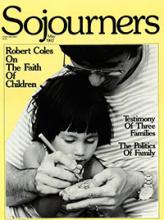How are Christian communities to interpret the contemporary crisis of family? Few doubt that the family is in crisis. But a crisis carries both danger and opportunity. Where is the danger? Where is the opportunity? These are questions for Christian communities to discern under the guidance of the Spirit.
But to discern among the various analyses and strategies, or even to create a new path, it is necessary to scrutinize the public debate on family. In order to understand the public debate, we need to set it within the context of its roots.
Tradition versus modernity
The contemporary debate on family has century-old roots in the rise of the so-called "modern world." The modern world defeated what we now call the "traditional world," where family and religion were central and strong in public life. Each of these worlds viewed history and the social structure differently, and therefore differed on the topics of family and religion set within that context.
The traditional world saw society as stable, organic, authoritarian, and religious, with family as central.
History really brought nothing new to the stable society, and change was considered dangerous. Society was also seen as organic, that is, all the parts were connected and everything was bound together. Finally, it was believed that only a strong authority could hold all the parts together and protect the stability of the structure.
The traditional world saw family as the basic building block of society. Family in turn reflected the assumptions of the wider society and was also stable in structure; it was assumed that the model of family could not change. Family was organic; the marriage bond was permanent, with divorce generally forbidden and unthinkable. Finally, it was authoritarian, with the father ruling over wife and children, like the king over the people.
Read the Full Article

